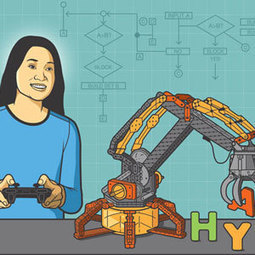Countless articles and blogs are being written on a daily basis pushing back on the coding movement suggesting “not all kids will be professional coders!”
Totally!
But that isn’t why we teach certain subjects. As a phys ed teacher, I don’t anticipate every student playing in the NBA (but I don’t discourage it either!). A well rounded approach to education is the best fit and by today’s standards, coding should be included.
Research and publish the best content.
Get Started for FREE
Sign up with Facebook Sign up with X
I don't have a Facebook or a X account
Already have an account: Login
News, reviews, resources for AI, iTech, MakerEd, Coding and more ....
Curated by
John Evans
 Your new post is loading... Your new post is loading...
 Your new post is loading... Your new post is loading...
|
|












